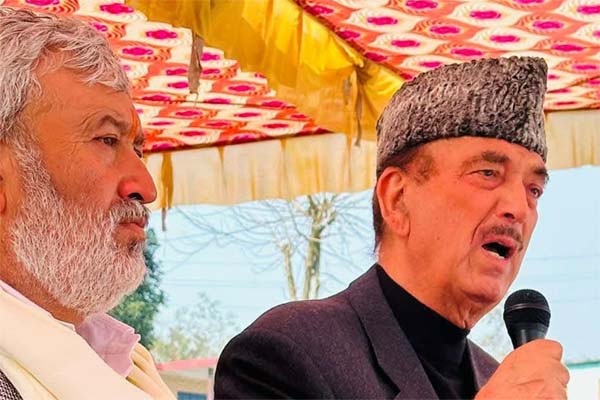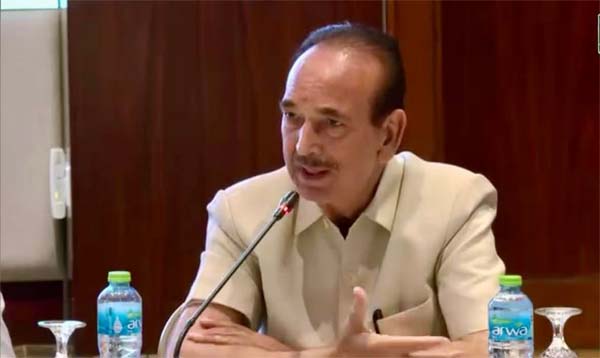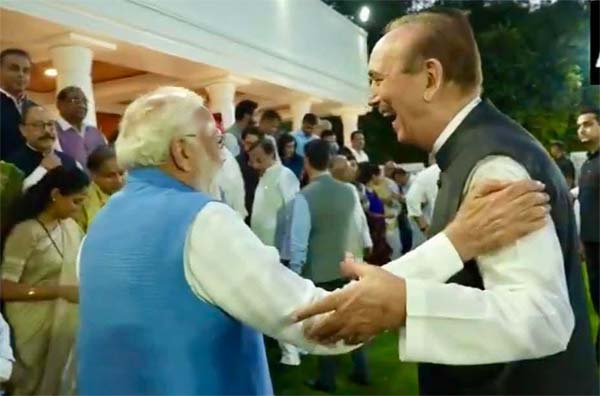Public voices and policy experts rally around the idea that Azad’s return as LG would be a milestone for national unity, regional healing, and all-round development
By Mansoor Qadir :
Jammu, June 28 : As national discussions intensify over the potential appointment of Ghulam Nabi Azad as the next Lieutenant Governor (LG) of Jammu and Kashmir, public sentiment across the Union Territory appears overwhelmingly supportive. From his transformative term as Chief Minister to his widely respected roles in national politics, Azad is being seen as a unifying figure — capable of bridging divides and delivering progress.
Political experts suggest that Azad’s appointment could bring back an era of balanced governance, regional inclusivity, and constitutional maturity in a region where public trust remains fragile.
A Transformative Tenure as Chief Minister of Jammu & Kashmir (2005–2008)
Ghulam Nabi Azad’s leadership as Chief Minister is often cited as one of the most development-focused periods in J&K’s modern history. He prioritized infrastructure, education, health, and employment — with a strong emphasis on equitable growth across all three regions: Jammu, Kashmir, and Ladakh.
Major Developmental Contributions in the Kashmir Valley
Azad’s commitment to the development of Kashmir Valley was evident in multiple sectors, aimed at ensuring growth and stability:

Strengthening Education: New degree colleges, ITIs, and girls’ schools were sanctioned in Kashmir districts including Kupwara, Baramulla, Anantnag, and Pulwama, expanding access to quality education for underprivileged communities.
Healthcare Access: District Hospitals in Srinagar, Pulwama, Shopian, and Ganderbal were upgraded with modern equipment. He initiated the setting up of new Community Health Centres and mobile medical services in hilly areas such as Gurez, Karnah, and Tangdhar.
Infrastructure & Connectivity: Roads like the Anantnag–Kishtwar, Kupwara–Tangdhar, and Shopian–Mughal Road routes were prioritized for faster connectivity. Bridges and power supply projects across North and South Kashmir improved logistics and quality of life.
Tourism & Local Economy: Azad promoted traditional tourism in Pahalgam, Gulmarg, and Sonamarg, but also emphasized rural tourism, heritage promotion, and horticulture-based employment in apple-producing belts.
His Kashmir policy was never based on tokenism — but on tangible, long-lasting developmental change. His approach was inclusive, development-driven, and peace-focused — winning hearts and trust in some of the most emotionally scarred areas of the Valley.

Bhaderwah, Chenab, and Jammu Region: Azad’s Broader Development Model
In the Jammu and Chenab regions too, Azad’s legacy stands tall:
Established the Bhaderwah Campus of Jammu University, bringing higher education to hilly students.
Sanctioned five Government Medical Colleges, including GMC Doda at Ghat.
Promoted Bhaderwah Valley as an international tourism hub, built roads and promoted eco-tourism, and organized cultural events.
Brought back many youth from militancy-prone belts of Doda, Kishtwar, and Ramban to mainstream society through development and dialogue.
Restoring Dignity in Governance
Azad is credited with breaking the bureaucratic oppression and politically biased governance left behind by earlier regimes, particularly the National Conference. His tenure is remembered for transparency, grassroots participation, and administrative outreach, including surprise inspections and people’s durbars across districts.
National Credentials That Serve Beyond J&K
Azad’s stature on the national stage is equally significant:
As Union Health Minister, he led national health reforms, built rural health missions, and earned WHO praise for managing H1N1 outbreaks.
As Leader of Opposition in Rajya Sabha, he maintained dignity and facilitated constructive democratic debate.
As Parliamentary Affairs Minister, he played a critical role in consensus-building during turbulent times.
Known for his nationalist stance and secular values, he remains one of the few Muslim leaders who have vocally defended India’s unity and integrity on every forum.
His clean, corruption-free record and balanced diplomacy have earned him cross-party respect.
A Strategic Appointment in National Interest
Appointing Ghulam Nabi Azad as LG of Jammu & Kashmir would serve multiple goals:
Restore public trust and confidence in governance
Re-establish an era of peace, employment, and youth engagement
Promote inclusive politics and national harmony
Send a powerful message to separatist narratives — that India values vision, unity, and democratic leadership.
Ghulam Nabi Azad is not merely a former Chief Minister. He is a national statesman, a development visionary, and a symbol of inclusive governance. His return in a constitutional role would mark the beginning of a new, hopeful chapter for Jammu and Kashmir — and a reminder to the nation that experience, integrity, and compassion still have a place in public life.
His leadership could be the bridge between wounds of the past and dreams of the future — for J&K and for India.



